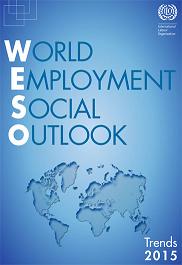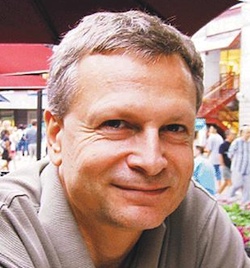World Economic Outlook Update, International Monetary Fund, January 2015. Cross Currents Global growth will receive a boost from lower oil prices, which reflect to an important extent higher supply. But this boost is projected to be more than offset by negative factors, including investment weakness as adjustment to diminished expectations about medium-term growth continues in many advanced and emerging market economies. Global growth in 2015–16 is projected at 3.5 …Read More
World Employment and Social Outlook – Trends 2015 (full report)
World Employment and Social Outlook – Trends 2015 (full report), International Labour Organization, January 2015. Summary Renewed turbulence over the employment horizon The world economy continues to expand at rates well below the trends that preceded the advent of the global crisis in 2008 and is unable to close the significant employment and social gaps that have emerged. The challenge of bringing unemployment and underemployment back to pre-crisis levels …Read More
Which economic theories are especially widely misunderstood?
Cowen, Τ. (2015) “Which economic theories are especially widely misunderstood?“, Marginal Revolution Blog, 20 January. A lot of them are, actually. The efficient markets hypothesis might be one, as I’m not sure I understand it myself! (Would the existence of just one investor “beating the market” disprove it? Probably not, but then how many are needed? How many of them have to beat the market “for the right reasons”? …Read More
Explaining the global trade slowdown
Constantinescu, C., Mattoo, A. & Ruta, M. (2015) “Explaining the global trade slowdown“, VoxEU Organisation, 18 January. Not only is world trade lower than its pre-Crisis level, but it is also growing slower than GDP. This column examines the relationship between trade and GDP in the last four decades. The findings indicate that roughly half of the slowdown is driven by structural rather than cyclical factors. Trade itself has …Read More
We should be wary of removing the ECB from the troika to facilitate the use of outright monetary transactions
Otero Iglesias, Μ. (2015) “We should be wary of removing the ECB from the troika to facilitate the use of outright monetary transactions“, LSE EUROPP, 19 January. A key legal debate in the context of the Eurozone crisis is whether so called ‘Outright Monetary Transactions’(OMT), which would allow the European Central Bank (ECB) to buy unlimited numbers of government bonds in secondary markets, are compatible with European law. The …Read More
SNB decision tells us that the crisis in entering a new phase
Mitchell, B. (2015) “SNB decision tells us that the crisis in entering a new phase“, Bill Mitchell Blog, 19 January. Switzerland – home of the secret bank vaults, which house treasures stolen from people (particularly the Jewish victims) by the Nazis during WW2 and ill-gotten cash by capitalists who wish to evade scrutiny of prudential and tax authorities of their domiciled nations. Now it is the canary, which has …Read More
What Will Populism Do To Europe?
Świeboda, P. (2015) “What Will Populism Do To Europe?“, Social Europe Journal, 15 January. There has been much wishful thinking in Europe that populism will vanish once growth rates pick up. Those who have believed in this unlikely miracle tended to assume that the populist upsurge is a natural reaction to economic misery brought about by the crisis. In this, they are only partly right. Populism is as much …Read More
From Welfare State To Innovation State
Rodrik, D. (2015) “From Welfare State To Innovation State, Social Europe Journal, 15 January. A specter is haunting the world economy – the specter of job-killing technology. How this challenge is met will determine the fate of the world’s market economies and democratic polities, in much the same way that Europe’s response to the rise of the socialist movement during the late nineteenth and early twentieth centuries shaped the …Read More
Tear down the trade-policy silos! Or how the servicification of manufacturing makes divides in trade policymaking irrelevant
Lodefalk, Μ. (2015) “Tear down the trade-policy silos! Or how the servicification of manufacturing makes divides in trade policymaking irrelevant“, VoxEU Organisation, 16 January. The manufacturing sector in OECD countries increasingly buys, produces, sells and exports services. This is now known as the servicification of manufacturing. This column, using firm-level data from Sweden, shows that as firms’ share of in-house services increases, so does their export intensity. The increasing …Read More
The fragmentation of power is irreversible
Conversation by Martin Eiermann with Parag Khanna: “The fragmentation of power is irreversible”, The European Magazine, 16 January 2015. The end of the nation-state as we know it: Parag Khanna discusses the path towards global connectivity and why we have to shift from Western history to global history. The European: Mr. Khanna, especially in Europe, we’re witnessing a resurgence of regionalist or nationalist thinking that seems to cast doubt …Read More










